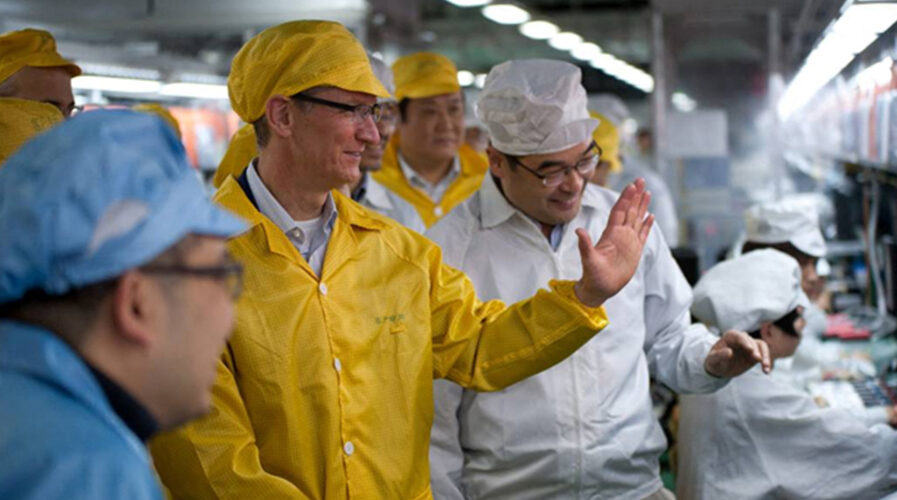
What is 2023 looking like for Apple and Foxconn?This handout picture released by Apple and taken on March 28, 2012 shows Apple chief executive Tim Cook (C-L) visiting the iPhone production line at the newly built Foxconn manufacturing facility at Zhengzhou Technology Park in the city of Zhengzhou in China’s north-central Henan province. The man tipped to be China’s next leader Vice Premier Li Keqiang, who met Cook in Beijing has told Apple that foreign firms should protect workers, state media said as the US giant fends off criticism over factory conditions in China. AFP PHOTO/APPLE – RESTRICTED TO EDITORIAL USE – MANDATORY CREDIT: “AFP PHOTO/APPLE” – NO MARKETING NO ADVERTISING CAMPAIGNS – DISTRIBUTED AS A SERVICE TO CLIENTS (Photo by APPLE / AFP)
- Key Apple supplier, Foxconn, predicts 2023 will likely be “flat” in terms of revenue growth amid uncertainties and various unexpected factors.
- Since TSMC’s 3nm chips are expected to enter commercial production this week, Apple could be the first to use the 3nm chips for its upcoming M2 Pro chips.
It has been a crazy final quarter of 2022 for both Apple Inc and its key supplier Foxconn. In fact, both companies are still recovering from disruption caused by the recent issues at the largest iPhone factory in Zhengzhou, China. So much so that Apple, whose smartphone had mostly been resilient to the global economic downturn, took a severe hit over this year’s holiday season.
While Apple remains attractive based on its robust balance sheet and sustained long-term growth trajectory, the company is still facing choppier waters ahead given the increasingly challenging macro environment. Even analysts are tamping down expectations for Apple’s December quarter iPhone sales, with some investors grappling with just how low the bottom is—whether sales are being lost or simply delayed—and how much the global macroeconomic downturn will affect demand.
For context, the iPhone 14 Pro and Pro Max models have been the spotlight for Apple’s newest line-up of handsets. Foxconn is the sole assembler of the both high-end iPhone models, the majority of which are made at Zhengzhou. Despite their heftier price tag, the Pro and Pro Max variants of the iPhone 14 are where the latest chip and performance upgrades are at, and demand for those devices have been soaring. But the spoked demand doesn’t necessarily spell good news for Apple nor Foxconn.
In fact, it is the Foxconn facility in Zhengzhou that were operating under a closed loop system, and is responsible for the output of more than 80% of global iPhone 14 Pro and Pro Max units. The other 20%, as analysts predict, likely comes from alternative sites, such as India, which is of course not immune to China’s sprawling Covid restrictions.
The situation simply implies a constrained environment for Apple’s better-selling and more profitable handsets during the holiday quarter. Meanwhile, production of the weaker-selling iPhone 14 standard models that have been shifted to Foxconn’s smaller manufacturing facilities across China to avoid material disruptions to output levels has a far lower take-rates.
The standard Phone 14 models have been relatively muted compared to their Pro and Pro Max counterparts, since mass market consumers engage in further belt-tightening with surging inflation and rising interest rates. Even Foxconn seems rather unsure of what could the new year bring, following such a disastrous final quarter of 2022.
Foxconn Chairman Young Liu said his company, for now, does not see any opportunity to massively grow revenue next year, partly due to this year’s high base. “For next year, we see cloud data center and networking products being the robust growth driver, but overall consumer electronics and smart electronic devices will still be slow and a bit weak,” Liu told an investors conference, as per Nikkei Asia’s report.
Even as the world’s biggest electronic contract manufacturer, Foxconn anticipates its revenue for the final quarter of this year to decline slightly compared to last year, mainly to the COVID-related disruption at its key iPhone plant in Zhengzhou, China, which began in October.
It’s not all gloom and doom
Apple and Foxconn may have had their fair share of issues this year, but it’s almost the same across the board, especially within the technology sector. But that also means, a sharp rebound in 2023 is in the works, as companies work to protect profitability and the Federal Reserve winds down its rate-hike campaign, among others, Wedbush Securities said.
“[In] this carnage we see growth opportunities as we believe overall the tech sector will be up roughly 20% in 2023 from current levels with Big Tech, software, and semis leading the charge despite the macro/Fed wild cards,” analyst Dan Ives wrote in a note published last Friday. To top it off, just yesterday, there were updates stating that Apple’s main chip supplier TSMC will kick off mass production of 3nm chips this week.
That would mean, Apple being the primary customer of the new process, could first be used in upcoming M2 Pro chips that are expected to power updated MacBook Pro and Mac mini models. According to the new report by DigiTimes, TSMC will start mass production of its next-generation 3nm chip process on Thursday, December 29, in line with reports from earlier in the year that said 3nm mass production would begin later in 2022.
Apple currently uses TSMC’s 4nm process in the A16 Bionic chip in the iPhone 14 Pro series but could jump to 3nm as soon as early next year. The M2 Pro chip is expected to debut first in updated 14-inch and 16-inch MacBook Pros early next year and possibly updated Mac Studio and Mac mini models, according to reports.





